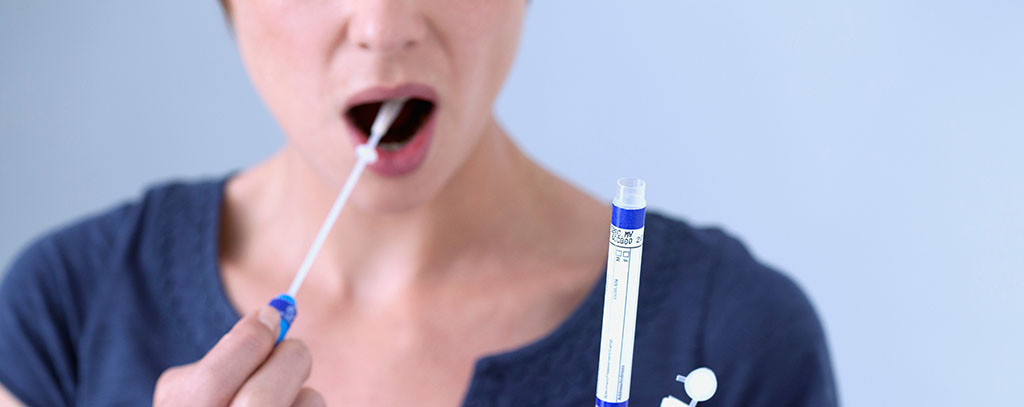


Everything You Need to Know About: Oral Drug Tests
February 3, 2023


Everything You Need to Know About Oral Fluid Drug Tests
February 9, 2023Drug testing is an important tool for employers, doctors, and other professionals to ensure the safety of their workers. One common drug that many people take is gabapentin; however, will it show up on a 12 panel drug test? This question can be difficult to answer as there are several factors at play when considering if gabapentin will appear in a standard 12-panel screening. In this blog post we'll explore what exactly gabapentin is and whether or not it will show up on a 12 panel drug test. We’ll also look into which substances these tests detect, how accurate they are and any additional considerations when taking Gabapentin. So if you're wondering "will gabapentin show up on a 12 panel drug test?" keep reading.
What is Gabapentin?
Gabapentin is a prescription medication used to treat nerve pain, seizures, and restless leg syndrome. It works by decreasing the activity of certain chemicals in the brain that can cause pain or other symptoms. Gabapentin is also sometimes used to treat anxiety and depression.
The drug has been around since 1993 when it was approved by the Food and Drug Administration (FDA). It is available as an oral tablet, capsule, liquid solution, extended-release tablet, or extended-release capsule. Common side effects include dizziness, drowsiness, nausea and vomiting.
Gabapentin belongs to a class of drugs called anticonvulsants which are used to control seizures caused by epilepsy or other neurological disorders such as neuropathy. The drug works by reducing abnormal electrical activity in the brain which helps reduce seizure frequency and intensity for those with epilepsy. In addition to treating seizure disorders it can also be prescribed off label for other conditions like chronic pain due its ability to reduce nerve signals from reaching their target areas in the body resulting in decreased sensations of pain being felt at these sites.
It does not typically show up on drug tests; however, it's important for employers and those administering drug tests to be aware of the potential for false positives when testing for certain drugs. Let's take a closer look at whether gabapentin will show up on a 12 panel drug test.
Does Gabapentin Show Up on Drug Tests?
It is an anticonvulsant drug that works by reducing the activity of certain chemicals in the brain. While it can be beneficial for some people, it can also be abused and has been linked to addiction.
Does Gabapentin Show Up on Drug Tests? Generally speaking, no. Most standard drug tests do not test for gabapentin specifically; however, some specialized tests may detect it if taken in large doses or over an extended period of time. This includes urine screens as well as hair follicle testing which are more sensitive than regular drug screenings and can detect drugs up to 90 days after they were last ingested.
It's important to note that even though gabapentin does not show up on most standard drug tests, employers may still choose to include it in their screening process depending on their company policies and regulations regarding substance abuse prevention programs (SAPs). In addition, many states have laws requiring employers to screen for specific substances such as opioids or benzodiazepines when conducting pre-employment testing so this could potentially include gabapentin too.
If you're taking gabapentin under a doctor's supervision then there shouldn't be any issue with disclosing this information during a job interview or pre-employment screening process since you would likely have documentation from your physician confirming its use as part of your medical history file. However, if you're using the medication without a prescription then this could raise red flags with potential employers who might view this behavior negatively due to its association with recreational drug use and addiction risk factors associated with illicit substances like opioids or cocaine etc.
In conclusion, while most standard drug tests will not detect gabapentin specifically there are certain circumstances where specialized testing methods may reveal its presence in someone’s system if taken in large doses or over an extended period of time. Therefore, it is important to always disclose any medications being taken prior to undergoing any type of employment related screening process just in case.
While gabapentin does not show up on most drug tests, it is important to understand what substances are detected in a 12-panel drug test in order to determine the best testing supplies for your organization.
What Substances Do 12- Panel Drug Tests Detect?
The 12 panel drug test is a comprehensive screening that detects the presence of various drugs in a person’s system. It is commonly used by employers, law enforcement agencies, and medical professionals to detect drug use or abuse. The substances tested for vary depending on the type of test being conducted but typically include amphetamines, barbiturates, benzodiazepines, cocaine, marijuana (THC), MDMA (ecstasy), methadone, opiates (codeine and morphine), phencyclidine (PCP), propoxyphene, and alcohol.
Lastly, alcohol consumption will show up on most 12-panel tests even though it is legal. Drinking too much can lead to serious health problems both in the short and long term, so it should still be consumed responsibly regardless of whether you are getting tested for drugs later on down the line.
12 panel drug tests can detect a wide variety of substances, including opioids, cocaine, amphetamines and barbiturates. However, it is important to understand the accuracy of these tests before relying on them for any purpose; this will be discussed in the next section.
How Accurate are Drug Tests?
Drug tests are an important tool for employers, medical professionals, and law enforcement to detect the presence of drugs in a person’s system. They can be used to test for illicit substances such as marijuana or cocaine, as well as prescription medications like opioids and benzodiazepines. The accuracy of drug tests is determined by several factors including the type of test being performed, the quality control measures taken during testing, and any potential cross-reactivity with other substances or medications that have similar chemical structures.
The most common type of drug test is urine analysis which looks for metabolites produced when a substance is broken down in the body. Urine analysis has been found to be highly accurate when conducted correctly and with proper quality control measures in place. However, false positives can occur due to cross-reactivity with other substances or medications that have similar chemical structures as the substance being tested for. For example, gabapentin may produce a false positive result on certain 12-panel drug tests if it shares structural similarities with another compound being tested for such as morphine or oxycodone.
Saliva testing is also commonly used but it has shorter detection period than urine analysis Saliva testing also does not provide information about long term use since it only detects recent usage within 1-2 days before collection time depending on how quickly each individual metabolizes drugs differently from one another.
Blood tests are considered more reliable than either saliva or urine because they measure active levels rather than metabolites which can vary significantly between individuals based on metabolism rate and age among other factors. Blood tests are usually reserved for situations where results need to be obtained quickly such as roadside sobriety checks by police officers but they do come at higher cost compared to other types of drug screens available today due to their complexity and the specialized equipment needed during sample collection process.
Finally hair follicle samples offer longer detection windows up to 90 days after last use however this method comes at even higher costs due its labor intensive nature requiring multiple steps during sample preparation process before actual screening begins . It also requires larger amounts of sample material compared to other methods making it less practical choice unless long term monitoring needs must be met .
Overall, drug tests remain reliable tools when properly administered under controlled conditions while considering potential sources of error caused by cross-reactivity between compounds sharing the same molecular structure, thus leading to possible false positives.
Drug tests can be highly accurate in detecting the presence of drugs, however it is important to consider other factors such as potential false positives or differences in testing protocols when determining the accuracy of a drug test. In the next section we will look at how taking gabapentin could affect your results.
Are There Any Other Considerations When Taking Gabapentin?
It can also be prescribed off-label for other conditions such as restless leg syndrome, fibromyalgia, and hot flashes. Gabapentin does not show up on most standard drug tests, but it may be detected in some specialized tests that are designed to detect the presence of gabapentin.
When taking gabapentin it is important to follow your doctor's instructions carefully and take only the prescribed dose as taking too much can lead to serious side effects such as confusion, drowsiness, difficulty breathing, and even coma in extreme cases. Additionally, gabapentin can interact with other medications so it is important to inform your doctor of any other medications you are taking before starting gabapentin therapy. For example if you are currently taking an opioid or sedative medication then there could be an increased risk of developing dangerous side effects when combining these drugs with gabapentin.
It is also important to discuss any potential allergies or sensitivities you have prior to beginning treatment with this drug as some people may experience allergic reactions when exposed to ingredients found in generic forms of the medication which could include lactose monohydrate or cornstarch among others. Furthermore, if you have a history of kidney disease then your doctor will likely adjust the dosage accordingly due to how quickly this drug gets eliminated from the body by way of renal excretion; meaning that those with impaired kidney function may need lower doses than normal in order for their bodies to process it properly without experiencing adverse effects from toxicity levels building up over time.
FAQs in Relation to Will Gabapentin Show Up on a 12 Panel Drug Test
What would gabapentin test positive for?
It does not typically show up on drug tests as it is not an illicit substance. However, in some cases gabapentin may be tested for and can produce false positives for benzodiazepines or barbiturates. Therefore, if a drug test specifically looks for gabapentin, it may test positive for the presence of this medication.
Can gabapentin cause false positive on drug test?
No, gabapentin does not cause false positives on drug tests. It is not an illicit substance and it will not show up as a false positive for any other drugs. However, there are some rare cases where gabapentin has been known to interfere with certain types of drug tests and produce inaccurate results. Therefore, if you are concerned about this possibility, it is best to consult your doctor or the manufacturer of the testing supplies before conducting a test.
What drugs are tested for on a 12 panel?
A 12 panel drug test typically tests for the following drugs: Amphetamines (including Ecstasy and Methamphetamine), Cocaine, Marijuana, Opiates (such as Heroin and Codeine), Phencyclidine (PCP), Barbiturates, Benzodiazepines, Propoxyphene, Methadone, Quaaludes, Tricyclic Antidepressants and Oxycodone. This type of testing is used to detect recent drug use in order to determine if an individual has been using any of these substances. It can also be used to monitor individuals who are on medication or undergoing treatment for substance abuse.
What does gabapentin show up as on a urine drug test?
Gabapentin does not show up on a standard urine drug test. However, it can be detected in some specialized tests that are designed to detect gabapentin specifically. These tests may include enzyme-linked immunosorbent assays (ELISA) or high-performance liquid chromatography (HPLC). It is important to note that these specialized tests are not typically used in routine drug testing and must be requested by the ordering physician.
Conclusion
In conclusion, it is important to understand the implications of taking gabapentin and how it may affect drug tests. Gabapentin does not show up on a 12-panel drug test as it is not included in the substances tested for. However, if you are concerned about potential interactions with other drugs or medications, be sure to consult your doctor before taking any new medication. Ultimately, understanding whether or not will gabapentin show up on a 12 panel drug test can help you make an informed decision when considering taking this medication.





